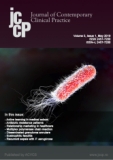Multiplex polymerase chain reaction (PCR) for rapid bacterial identification from blood cultures: ready for prime time in India?
Multiplex polymerase chain reaction (PCR) for rapid bacterial identification from blood cultures: ready for prime time in India?
Author(s): Yamunadevi Vellore Ramanathan, Rajalakshmi Arjun, Vidya Krishna, Anil Tarigopula, Ram GopalakrishnanSubject(s): Health and medicine and law, Present Times (2010 - today)
Published by: Asociația pentru Creșterea Vizibilității Cercetării Științifice (ACVCS)
Keywords: FA-BCID panel; de-escalation; India; KPC; NDM;
Summary/Abstract: Introduction Early identification and determination of antimicrobial susceptibilities of microorganisms growing in blood cultures is crucial as delay can lead to increased mortality, morbidity and cost. This study was done to evaluate the usefulness of the FilmArray blood culture identification (FA-BCID) in comparison with conventional techniques in early identification and antimicrobial initiation. Methods This was a single centre, prospective study conducted in a 24-bed critical care unit (CCU) of a tertiary care hospital at Chennai, India between October 2016 and December 2016. Patients whose blood culture bottles were flagged using the BACTEC-FX system were included. The blood culture was processed by FA-BCID and by conventional method and the results were compared. Results A total of 36 positive blood cultures were analyzed by both FA-BCID and conventional method from patients admitted in the CCU. FA-BCID accurately identified 80% of the organisms. Of 32 isolates identified by FA-BCID, 50% (16/32) showed isolated growth of Gram negative bacteria (GNB), 37.5% (12/32) showed isolated growth of Gram positive (GP) bacteria, whereas 12.5% (4/32) showed >1 micro-organism in the same culture bottle. Overall, sensitivity, specificity, positive predictive value and negative predictive value were 100% for the identification of GP bacteria, and 69%, 100%, 100% and 76.4% for GNB, respectively. FA-BCID identified oxacillin resistance (mec A) accurately, whereas resistance mechanisms could not be predicted at all in cases of Gram negatives as the kit only has KPC gene identification system. The turnaround time of FA-BCID was a median of 2 hours compared to 2 days for the conventional method. Antibiotics were de-escalated or escalated in 47.2% of patients based on FA-BCID within a median time of 3 hours. Conclusion FA-BCID is a significant advance in the early identification and escalation or de-escalation of treatment for bacteremia in critically ill patients, with a high sensitivity for Gram positive bacteria as compared to Gram negative bacteria. Incorporation of probes for prevalent pathogens and resistance genes would make this panel more useful in Indian settings.
Journal: Journal of Contemporary Clinical Practice
- Issue Year: 5/2019
- Issue No: 1
- Page Range: 24-30
- Page Count: 7
- Language: English

